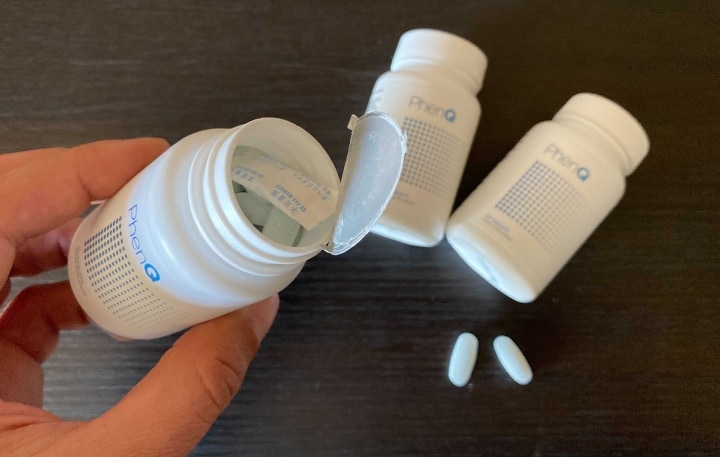Does PhenQ Cause Constipation? (How to Prevent it)
Max Health Living is a reader-supported site. Purchases made through links may earn a commission. Learn more.
Like for most drugs and fitness supplements, gut problems are the most commonly reported side effects of PhenQ.
It may cause nausea, bloating, or diarrhea if you are sensitive to its ingredients. However, this weight loss pill has a low potential to make you constipated.
Key Points:
- PhenQ affects gut functions, but constipation is rarely reported from this weight loss pill.
- In contrast, most of its ingredients can help you escape constipation.
- Healthy meal choices and regular workouts can help you avoid constipation with appetite suppressants.
- Find more about PhenQ on their official website.
In this article, I have discussed how much potential PhenQ ingredients hold to constipate you and what you can do to avoid this adversity.
So, keep reading to find out all these details.
Do Appetite Suppressants Make You Constipated?

In short, yes, they can make you constipated.
The underlying reason can be the effect of an ingredient on gut functions or the lack of preventive measures you must take when using diet pills.
1. Appetite Suppressants Can Alter Gut Motility
Hunger-reducing agents of diet pills are often high-potency compounds that can irritate the gut lining, inducing a change in GI secretions and motility.
Sometimes, appetite suppressants reduce motility to induce a fake sense of fulfillment, preventing high-calorie intake.
This effect may keep you from binge eating, but a bulk of fecal material gets stuck in the body when the intestines retain food for longer. Ultimately, this mass hardens, and passing stools out becomes even more difficult.
2. Stimulants In Diet Pill Can Cause Constipation
Stimulatory weight loss pills are usually the most effective ones, and that’s why they are also used frequently.
However, these powerful appetite suppressants and fat burners also have a high potential to cause anxiety and stress.
As the gut and brain are strongly connected, stress conditions often cause indigestion and slow down bowel movements, resulting in constipation.
Also, stimulants can induce insomnia, a risk factor for gastrointestinal dysfunction and constipation.
3. Diuretic Ingredients Can Lead To Dehydration
Another reason for appetite suppressants causing constipation is some of them have a diuretic effect. Resultantly, frequent urination will make you dehydrate if you don’t take plenty of fluids with these drugs.
In turn, dehydration is one of the main causes of constipation.
As your body quickly takes up the water from the gut to compensate for dehydration, less fluid is left in the feces, making them stiffer and harder to expel.

Why Does PhenQ Cause Constipation?
Considering the ingredient profile and user feedback, it is a rare event to get constipated due to PhenQ.
1. By Formulation, PhenQ Has Laxative Properties; however,…
Except for the diet and dosage mistakes mentioned below, PhenQ is less likely to cause constipation.
Its ingredients, like l-carnitine, Alpha Lipoic Acid, Nopal cactus fiber, Chromium Picolinate, and caffeine, have laxative properties and are often clinically used to cure different types of constipation.
2. Taking Fat Burner At the Wrong Time May Lead To Constipation
Taking PhenQ in the evening can ultimately lead to constipation if done constantly.
These diet pills should not be used too late in the day because their high caffeine content can disrupt sleep patterns.
It can make it difficult to fall asleep and reduce sleep quality. And sleep deprivation affects every system of your body adversely.
Research done on 17,529 individuals who worked late shifts, compromising their sleep, proves sleeplessness is a potent cause of indigestion and constipation.
3. Overdosing Can Ultimately Harden Stools
PhenQ has a sound safety profile because it includes all ingredients in a moderate proportion. That is why most people can easily tolerate its stimulatory effects.
However, if you exceed the recommended dose, you will consume a large quantity of caffeine which can lead to dehydration due to its diuretic effect.
And as discussed above, dehydration is the leading cause of constipation.
That is why you must conform to the recommended dose to prevent caffeine overdose side effects like dehydration, constipation, or jitters.
4. Low-fiber Diet with PhenQ Can Result in Constipation
Another reason for getting constipated with PhenQ can be your diet and lifestyle.
If your diet contains only a minimal amount of dietary fiber, you are at risk of getting constipated easily. That’s because;
- Low-fiber meals are digested relatively more slowly than fiber-rich meals, as the gut must break down all the components.
- Fiber helps the food move forward in the digestive tract.
- Fiber nourishes gut microbiota that helps with digestion and bowel upregulation and protects your gut against infections and diseases.
With low-fiber meals, you are deprived of all these benefits, and bowel movements can become slower, resulting in constipation.
Related Post: What to Eat when taking PhenQ?
Constipation With PhenQ – Real Reviews
Personally, I have found no PhenQ user complaining of constipation by taking the diet pill.
Similarly, users share no such experience on social media like Reddit, Quora, Facebook, or Twitter.
And among 469 PhenQ Trustpilot reviews, only 1 user Cristian reported constipation with the fat burner.
How To Avoid Constipation While Using PhenQ?
Try following tips to avoid & cure constipation while being on PhenQ and enjoy its weight-reducing benefits without discomfort.
1. Add More Fiber To Your Meals
Adding fiber to your diet is the number one suggestion you will hear from nutritionists and health experts to avoid constipation.
And it’s worth mentioning, too, because of the multiple benefits of fibrous foods.
To take more fiber, eat more fruits and leafy vegetables as these foods provide natural fiber and plenty of antioxidants to relax your gut lining and help it expel the stools.
Besides that, beans, lentils, chia seeds, flaxseeds, and whole grains like oats, wheat, rice, and barley are good sources of dietary fiber.
2. Probiotics Can Help
Probiotics, aka friendly gut bacteria, play protective roles for intestinal walls and save them from drug reactions.
Also, these bacteria secrete anti-inflammatory products and vitamins to help the gut lining function optimally, resulting in a more streamlined bowel movement.
A study published in the Journal of Clinical Nutrition presents the results from 15 controlled trials showing that probiotic intake makes the stool softer and also improves stool frequency.
You can get probiotics in fermented foods like yogurt, yogurt-based drinks, kefir, Kombucha, or fermented pickles.
Also, many probiotic products like Yourbiology’s Gut+ are available in the market that delivers specific strains and enhance your gut microbiome.
3. Increase Your Fluid Intake
As discussed above, dehydration leads to constipation, but you can prevent this discomfort by keeping yourself well-hydrated.
Increase your fluid intake so that enough water is present in your gut to keep stool soft and easily passable.
A clinical trial done in Rome unveiled a surprising effect of water intake on the laxative efficacy of dietary fibers. According to this study, increasing water intake makes a fibrous diet more effective against constipation.
4. Workout Regularly
Workouts, especially aerobic exercises, are an effective remedy for constipation.
Aerobic exercises greatly enhance the flow of oxygen in your body, improving oxygen supply to the internal tissues as well.
Resultantly, the muscles of the gut lining also get more oxygen, and their activity is improved.
When the tension in gut walls is reduced, motility increases, and feces are excreted more easily.
5. Try A Herbal Tea
Herbal teas are a soothing companion for good gut health.
-
For Treatment
Senna tea is the most potent and effective solution for constipation. It can relieve constipation within 2-3 days.
Though it’s a strong laxative and effective for treatment, it may not be the best choice to avoid hard stools.
The reason it is not recommended for constant, long-term usage is it can cause laxative dependency. So, I would only suggest taking it twice or thrice a month or when you have constipation.
-
For Prevention
Alternatively, you can try ginger, chamomile, or peppermint tea for regular use.
These herbal infusion drinks contain phytols and catechins that streamline bowel movements and ease out the excretion of feces.
Gingerols in ginger tea are especially helpful for improving digestive functions.
You can make this tea using only 2 ingredients easily available in every household. Here is a simple recipe to prepare ginger tea from scratch;
Ingredients:
- 1 cup of water
- 3 cm chunk of ginger
- 1 tablespoon of Honey, sugar, or any other sweetener (optional)
How to make it:
- Boil the water on high heat.
- Add ginger piece and let the tea steep for 3-4 minutes.
- Strain the tea in a cup.
- Optionally, you can mix Honey or a sweetener to improve the taste.
- Enjoy your relaxing anti-constipation tea.
Additional tip: To make senna, chamomile, or peppermint tea, replace the ginger with 1 tablespoon of the respective herb.
Important Disclaimer: The information contained on MAX HEALTH LIVING is intended for informational and educational purposes only. Any statements made on this website have not been evaluated by the FDA and any information or products discussed are not intended to diagnose, cure, treat, or prevent any disease or illness. Please consult a healthcare practitioner before making changes to your diet or taking supplements that may interfere with medications.
Who We Are

We are a team of fitness, health, and supplement experts, and content creators. Over the past 4 years, we have spent over 123,000 hours researching food supplements, meal shakes, weight loss, and healthy living. Our aim is to educate people about their effects, benefits, and how to achieve a maximum healthy lifestyle. Read more.



